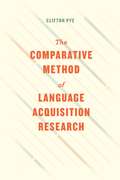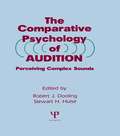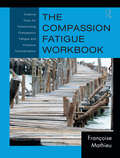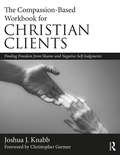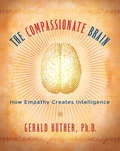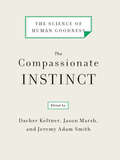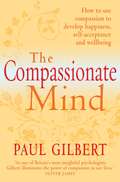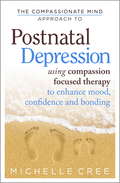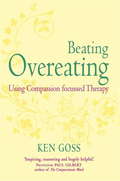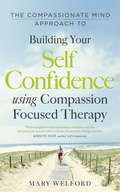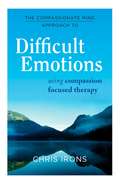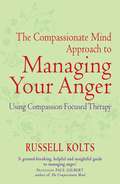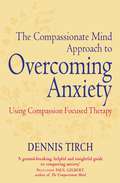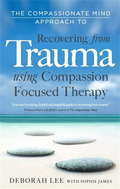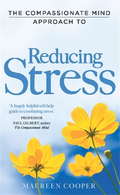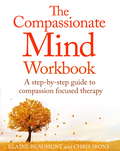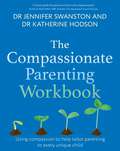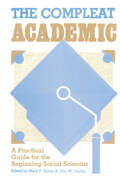- Table View
- List View
The Comparative Method of Language Acquisition Research
by Clifton PyeThe Mayan family of languages is ancient and unique. With their distinctive relational nouns, positionals, and complex grammatical voices, they are quite alien to English and have never been shown to be genetically related to other New World tongues. These qualities, Clifton Pye shows, afford a particular opportunity for linguistic insight. Both an overview of lessons Pye has gleaned from more than thirty years of studying how children learn Mayan languages as well as a strong case for a novel method of researching crosslinguistic language acquisition more broadly, this book demonstrates the value of a close, granular analysis of a small language lineage for untangling the complexities of first language acquisition. Pye here applies the comparative method to three Mayan languages—K’iche’, Mam, and Ch’ol—showing how differences in the use of verbs are connected to differences in the subject markers and pronouns used by children and adults. His holistic approach allows him to observe how small differences between the languages lead to significant differences in the structure of the children’s lexicon and grammar, and to learn why that is so. More than this, he expects that such careful scrutiny of related languages’ variable solutions to specific problems will yield new insights into how children acquire complex grammars. Studying such an array of related languages, he argues, is a necessary condition for understanding how any particular language is used; studying languages in isolation, comparing them only to one’s native tongue, is merely collecting linguistic curiosities.
The Comparative Psychology of Audition: Perceiving Complex Sounds
by Robert J. Dooling Stewart H. HulseUniting scientists who study music, child language, human psychoacoustics, and animal acoustical communication, this volume examines research on the perception of complex sounds. The contributors' papers focus on finding a common principle from the comparison of the processing of complex acoustic signals. This volume emphasizes the "comparative" and the "complex" in auditory perception. Topics covered range from communication systems in mice, birds, and primates to the perception and processing of language and music by humans.
The Compassion Fatigue Workbook: Creative Tools for Transforming Compassion Fatigue and Vicarious Traumatization (Psychosocial Stress Series)
by Françoise MathieuThe Compassion Fatigue Workbook is a lifeline for any helping professional facing the physical and emotional exhaustion that can shadow work in the helping professions. Since 2001 the activities in this Workbook have helped thousands of helpers in the fields of healthcare, community mental health, correctional services, education, and the military. In addition to a comprehensive description of compassion fatigue and vicarious traumatization, The Compassion Fatigue Workbook leads the reader through experiential activities designed to target specific areas in their personal and professional lives. It provides concrete strategies to help the reader develop a personalized plan for identifying and transforming compassion fatigue and vicarious traumatization. Topics covered include: understanding compassion fatigue and vicarious trauma symptom checklist targeting areas for strategic planning understanding warning signs assessing contributing factors evaluating self-care identifying triggers solutions: personal, professional and organizational strategies.
The Compassion-Based Workbook for Christian Clients: Finding Freedom from Shame and Negative Self-Judgments
by Joshua J. KnabbThe Compassion-Based Workbook for Christian Clients integrates contemporary research in clinical psychology on compassion-based approaches to shame with a Christian worldview, offering a wide variety of strategies for Christians to better understand and combat shame and negative self-judgments. Chapters lay out a four-step process to help clients let go of unhelpful thinking patterns that lead to shame, experience God’s compassion on a deeper level, and extend this compassion to themselves and others. Readers will find a wealth of Christian-sensitive experiential exercises, journaling assignments, biblical examples, and case examples throughout the workbook. Audio recordings for several guided meditations are also provided to help Christians practice the strategies offered in the workbook.
The Compassionate Brain: A Revolutionary Guide to Developing Your Intelligence to Its Full Potential
by Gerald HütherHere is the ultimate explanation of the brain for everyone who thinks: a guide to how the brain works, how our brains came to operate the way they do, and, most important, how to use your precious gray matter to its full capacity. The brain, according to current research, is not some kind of automatic machine that works independently of its user. In fact, the circuitry of the brain actually changes according to how one uses it. Our brains are continuously developing new capacities and refinements--or losing them, depending upon how we use them. Gerald Hüther takes us on a fascinating tour of the brain's development--from one-celled organisms to worms, moles, apes, and on to us humans--showing how we truly are what we think: our behavior directly affects our brain capacity. And the behavior that promotes the fullest development of the brain is behavior that balances emotion and intellect, dependence and autonomy, openness and focus, and ultimately expresses itself in such virtues as truthfulness, considerateness, sincerity, humility, and love. Hüther's user's-manual approach is humorous and engaging, with a minimum of technical language, yet the book's message is profound: the fundamental nature of our brains and nervous systems naturally leads to our continued growth in intelligence and humanity.
The Compassionate Instinct: The Science of Human Goodness
by Jason Marsh Dacher Keltner Jeremy Adam SmithLeading scientists and science writers reflect on the life-changing, perspective-changing, new science of human goodness. In these pages you will hear from Steven Pinker, who asks, "Why is there peace?"; Robert Sapolsky, who examines violence among primates; Paul Ekman, who talks with the Dalai Lama about global compassion; Daniel Goleman, who proposes "constructive anger"; and many others. Led by renowned psychologist Dacher Keltner, the Greater Good Science Center, based at the University of California in Berkeley, has been at the forefront of the positive psychology movement, making discoveries about how and why people do good. Four times a year the center publishes its findings with essays on forgiveness, moral inspiration, and everyday ethics in Greater Good magazine. The best of these writings are collected here for the first time. A collection of personal stories and empirical research, The Compassionate Instinct will make you think not only about what it means to be happy and fulfilled but also about what it means to lead an ethical and compassionate life.
The Compassionate Instinct: The Science of Human Goodness
by Jason Marsh Dacher Keltner Jeremy Adam SmithLeading scientists and science writers reflect on the life-changing, perspective-changing, new science of human goodness. In these pages you will hear from Steven Pinker, who asks, "Why is there peace?"; Robert Sapolsky, who examines violence among primates; Paul Ekman, who talks with the Dalai Lama about global compassion; Daniel Goleman, who proposes "constructive anger"; and many others. Led by renowned psychologist Dacher Keltner, the Greater Good Science Center, based at the University of California in Berkeley, has been at the forefront of the positive psychology movement, making discoveries about how and why people do good. Four times a year the center publishes its findings with essays on forgiveness, moral inspiration, and everyday ethics in Greater Good magazine. The best of these writings are collected here for the first time. A collection of personal stories and empirical research, The Compassionate Instinct will make you think not only about what it means to be happy and fulfilled but also about what it means to lead an ethical and compassionate life.
The Compassionate Mind
by Prof Paul Gilbert'Wise and perceptive. [It] teaches self-compassion and the consolations of kindness. I recommend it.' SALLY BRAMPTON, author of Shoot the Damn DogDEVELOP YOUR FEELINGS OF COMPASSION AND INCREASE YOUR SENSE OF WELL-BEING In societies that encourage us to compete with each other, compassion is often seen as a weakness. Striving to get ahead, self-criticism, fear, and hostility towards others seem to come more naturally to us.The Compassionate Mind explains the evolutionary and social reasons why our brains react so readily to threats - and reveals how our brains are also hardwired to respond to kindness and compassion.Research has found that developing kindness and compassion for ourselves and others builds our confidence, helps us create meaningful, caring relationships and promotes physical and mental health. Far from fostering emotional weakness, practical exercises focusing on developing compassion have been found to subdue our anger and increase our courage and resilience to depression and anxiety. 'As one of Britain's most insightful psychologists, Gilbert illuminates the power of compassion in our lives.' OLIVER JAMES, AUTHOR OF AFFLUENZA
The Compassionate Mind Approach To Postnatal Depression: Using Compassion Focused Therapy to Enhance Mood, Confidence and Bonding
by Michelle CreeIt is well-known that having a baby can be a time of joy but also one of anxiety and even depression for new mothers. Indeed it is very common for new mothers to experience a short period of distress following childbirth, often referred to as 'baby blues'. Usually this passes quite quickly, however for more than 1 in 10 women, this distressing experience can be more prolonged. This practical self-help book based on Compassion Focused Therapy will help women to recognise some of the symptoms and, where appropriate, to normalise them, thereby alleviating their distress. It will also guide mothers-to-be and new mothers through the maze of confusing feelings that can arise. Not only will this book cover the basic experiences and symptoms associated with anxiety and depression and childbirth, an evolutionary model of why this occurs, and an outline of the basic Compassionate Mind model, it will guide the reader through a series of exercises that they can use for themselves to develop their compassionate mind and work on their difficulties.
The Compassionate Mind Approach To Postnatal Depression: Using Compassion Focused Therapy to Enhance Mood, Confidence and Bonding (Compassion Focused Therapy)
by Michelle CreeIt is well-known that having a baby can be a time of joy but also one of anxiety and even depression for new mothers. Indeed it is very common for new mothers to experience a short period of distress following childbirth, often referred to as 'baby blues'. Usually this passes quite quickly, however for more than 1 in 10 women, this distressing experience can be more prolonged.This practical self-help book based on Compassion Focused Therapy will help women to recognise some of the symptoms and, where appropriate, to normalise them, thereby alleviating their distress. It will also guide mothers-to-be and new mothers through the maze of confusing feelings that can arise. Not only will this book cover the basic experiences and symptoms associated with anxiety and depression and childbirth, an evolutionary model of why this occurs, and an outline of the basic Compassionate Mind model, it will guide the reader through a series of exercises that they can use for themselves to develop their compassionate mind and work on their difficulties.
The Compassionate Mind Approach to Beating Overeating: Series editor, Paul Gilbert
by Kenneth GossThis self-help book explores the problems created by having ready access to high fat foods designed to taste good. Because we evolved in conditions of relative scarcity we have few natural food inhibitors and so most diet books try to encourage people to inhibit their eating by highly rule governed behaviours which have to be constantly worked at. However, this can lead to various forms of self-criticism which can undermine efforts at self-control. As a result our relationship with eating can be complex, multifaceted and problematic.Beating Overeating Using Compassion Focused Therapy uses Compassion Focused Therapy - a groundbreaking new therapeutic approach - to understand and work with our urges and passions for food. We can learn to enjoy and accept food and pay attention to our biological and emotional needs. This book is for people who have tried diets and found that they don't work and will enable the reader to have a healthier and happier relationship with food and their body.Topics covered: The relationship between our brains and food, the evolutionary background to finding, conserving and eating food How too much or too little food affects the brain, why diets don't work, factors affecting our eating behaviour (tastes, stress, comfort, etc) Body shape and culture Developing an inner compassion for one's relationship with food - recognising what we need and what is helpful
The Compassionate Mind Approach to Building Self-Confidence: Series editor, Paul Gilbert (Compassion Focused Therapy Ser.)
by Mary WelfordMany of us have a tendency to measure our self-worth by comparing ourselves to others. But when we fail to reach our own, families, communities or societies 'ideals' this often results in feelings of inadequacy, anxiety and low mood. We may become self-critical, experience shame and a sense of being different from others. Although an improvement in 'self-esteem' is what we may feel we want this is not necessarily what we need. This is because self-esteem is often associated with times when things are going well but can fail us when things do not go to plan. In contrast self-confidence, built from self-compassion, can help us when things are going well and make us more resilient when things are difficult.This book uses the ideas and practices of Compassion Focused Therapy to help build self-confidence. Attention is also paid to difficulties that often come hand in hand with lack of self-confidence such as anxiety, depression, substance use and anger.
The Compassionate Mind Approach to Building Self-Confidence: Series editor, Paul Gilbert (Compassion Focused Therapy)
by Dr Mary WelfordMany of us have a tendency to measure our self-worth by comparing ourselves to others. But when we fail to reach our own, families, communities or societies 'ideals' this often results in feelings of inadequacy, anxiety and low mood. We may become self-critical, experience shame and a sense of being different from others. Although an improvement in 'self-esteem' is what we may feel we want this is not necessarily what we need. This is because self-esteem is often associated with times when things are going well but can fail us when things do not go to plan. In contrast self-confidence, built from self-compassion, can help us when things are going well and make us more resilient when things are difficult.This book uses the ideas and practices of Compassion Focused Therapy to help build self-confidence. Attention is also paid to difficulties that often come hand in hand with lack of self-confidence such as anxiety, depression, substance use and anger.
The Compassionate Mind Approach to Difficult Emotions: Using Compassion Focused Therapy
by Chris IronsEmotions bring purpose, pleasure and meaning to our lives. However, for many people, they are synonymous with distress, pain and suffering. Anger and rage can wreck relationships and cause problems at work; anxiety can prevent us from socialising or engaging in things we would like to; sadness can feel overwhelming and never ending. These types of difficulties are often referred to as emotion regulation problems, and can prevent us from developing stable and happy relationships, communicating our needs, and flourishing.This practical self-help book based on Compassion Focused Therapy (CFT) will help you to take a new approach to managing difficult emotions. It outlines why we experience emotions, how they can be helpful but also how and why we can get in to struggles with them. It outlines the Compassionate Mind model, and guides you through a series of exercises that will help you to develop your compassion mind, and use this to develop more helpful emotion regulation strategies, and bring greater balance to your emotions.
The Compassionate Mind Approach to Difficult Emotions: Using Compassion Focused Therapy (Compassion Focused Therapy)
by Chris IronsEmotions bring purpose, pleasure and meaning to our lives. However, for many people, they are synonymous with distress, pain and suffering. Anger and rage can wreck relationships and cause problems at work; anxiety can prevent us from socialising or engaging in things we would like to; sadness can feel overwhelming and never ending. These types of difficulties are often referred to as emotion regulation problems, and can prevent us from developing stable and happy relationships, communicating our needs, and flourishing.This practical self-help book based on Compassion Focused Therapy (CFT) will help you to take a new approach to managing difficult emotions. It outlines why we experience emotions, how they can be helpful but also how and why we can get in to struggles with them. It outlines the Compassionate Mind model, and guides you through a series of exercises that will help you to develop your compassion mind, and use this to develop more helpful emotion regulation strategies, and bring greater balance to your emotions.
The Compassionate Mind Approach to Managing Your Anger: Using Compassion-focused Therapy (Compassion Focused Therapy)
by Russell KoltsWe can all get angry from time to time but when it gets out of hand it can have a serious impact on many aspects of our lives. As well as having an impact on our physical and mental health and our ability to engage in healthy relationships, it can also potentially have an enormous impact on society. The media is rife with stories of domestic violence, tragic stories of shaken babies, road-rage incidents and bullying.Mounting evidence suggests that all this anger can be harmful to us in a number of different ways. As well as the enormously damaging impact chronic anger can have on our relationships with other people, it is being linked to health problems such as cardiovascular disease and irritable bowel syndrome (IBS) and mental illnesses such as depression and post-traumatic stress disorder (PTSD). This invaluable self-help guide will enable the reader to recognise their personal anger problems, gain an understanding of what lies behind their anger, and use techniques based on Compassion Focused Therapy (CFT) to deal with their anger more effectively. CFT was initially developed by Professor Paul Gilbert, author of The Compassionate Mind, to treat those with high levels of self-criticism. It uses the proven, research-based techniques of CBT and other therapies with a special focus on the importance of developing inner compassion, in order to alleviate feelings of shame, develop a more balanced outlook and promote resilience. It incorporates elements of mindfulness and Tibetan Buddhism with recent research on human development and studies of the brain. It is increasingly used to treat a wide range of emotional and psychological problems including depression, overeating, shyness, trauma, anxiety and anger.
The Compassionate Mind Approach to Overcoming Anxiety: Using Compassion-focused Therapy (Compassion Focused Therapy)
by Dennis TirchWe know what it's like to worry from time to time, but for some of us, our worrying can take over and have a serious impact on our lives. When our anxiety gets out of hand and starts to dominate our lives, affecting how we function and our general sense of wellbeing, it's time to do something about it. This accessible self-help guide provides the reader with a clear understanding of how problem anxiety develops, the kinds of problems it's causing them and sets out ground-breaking Compassion Focused Therapy (CFT) techniques to overcome their anxiety . CFT was initially developed by Professor Paul Gilbert OBE, author of the bestselling The Compassionate Mind which set out his ground-breaking approach, to treat those with high levels of shame and self-criticism. It uses the proven, research-based techniques of CBT and other therapies with a special focus on the importance of developing inner compassion, in order to alleviate feelings of shame, develop a more balanced outlook and promote resilience. It incorporates elements of mindfulness and Tibetan Buddhism with recent research on human development and studies of the brain. It is increasingly used to treat a wide range of emotional and psychological problems including depression, overeating, shyness, trauma, anxiety and anger.
The Compassionate Mind Approach to Recovering from Trauma: Using Compassion Focused Therapy (Compassion Focused Therapy)
by Deborah Lee Sophie JamesTerrible events are very hard to deal with and those who go through a trauma often feel permanently changed by it. Grief, numbness, anger, anxiety and shame are all very common emotional reactions to traumatic incidents such as an accident or death of a loved one, and ongoing traumatic events such as domestic abuse. How we deal with the aftermath of trauma and our own emotional response can determine how quickly we are able to 'move on' and get back to 'normality' once more. An integral part of the recovery process is not only recognising and accepting how our lives may have been changed but also learning to deal with feelings of shame - an extremely common reaction to trauma.'Recovering from Trauma' uses the groundbreaking Compassion Focused Therapy to help the reader to not only develop a fuller understanding of how we react to trauma, but also to deal with any feelings of shame and start to overcome any trauma-related difficulties.
The Compassionate Mind Approach to Reducing Stress
by Maureen CooperStress is an unavoidable part of life that we will all encounter at various times in our lives, be it due to a one-off event such as losing a job or the break-up of a relationship, or from facing long-term difficulties such as working in a stressful environment or caring for someone who is ill. How well we deal with stress will influence the extent to which it affects our lives. In this ground-breaking book, Maureen Cooper explains why we are designed to respond to stress in a certain way and why this can even be helpful at times. She goes on to explain, using practical examples and techniques, what we can do to change our stress response if it becomes overstimulated, thereby improving our sense of control and wellbeing. This self-help book is based on the Compassionate Mind Approach, which has been developed by Professor Paul Gilbert, a clinical psychologist who is internationally renowned for his research and clinical work on depression. The Compassionate Mind Approach combines proven, research-based Western therapy techniques such as CBT with Mindfulness, Tibetan Buddhist practices and recent research on human development and studies of the brain.
The Compassionate Mind Workbook: A step-by-step guide to developing your compassionate self
by Chris Irons Dr Elaine BeaumontThere is good and increasing evidence that cultivating compassion for one's self and others can have a profound impact on our physiological, psychological and social processes. In contrast, concerns with inferiority, shame and self-criticism can have very negative impacts on these processes and are associated with poorer physical and mental health. The Compassionate Mind Workbook is for anyone who is interested in how compassion - in the form of ideas and practices derived from Compassion Focused Therapy (CFT) and other approaches - may help us to engage with, understand and ultimately, try to alleviate suffering. CFT utilises both Buddhist practices and Western psychological science. It draws on neuroscience, insights into emotion regulation and identity formation, interpersonal psychology and a range of psychotherapeutic models. CFT-based interventions can help people with a range of mental health problems develop compassion for themselves, be open to the compassion of others and develop compassion for others.This workbook is a step-by-step guide to CFT, in which the chapters build your understanding of yourself, the skills that give rise to a compassionate mind, and ways to work with whatever difficulties you're struggling with in life. The exercises, prompts and case stories in this book provide an understandable and practical way to develop compassion.
The Compassionate Mind Workbook: A step-by-step guide to developing your compassionate self
by Chris Irons Elaine BeaumontThere is good and increasing evidence that cultivating compassion for one's self and others can have a profound impact on our physiological, psychological and social processes. In contrast, concerns with inferiority, shame and self-criticism can have very negative impacts on these processes and are associated with poorer physical and mental health. The Compassionate Mind Workbook is for anyone who is interested in how compassion - in the form of ideas and practices derived from Compassion Focused Therapy (CFT) and other approaches - may help us to engage with, understand and ultimately, try to alleviate suffering. CFT utilises both Buddhist practices and Western psychological science. It draws on neuroscience, insights into emotion regulation and identity formation, interpersonal psychology and a range of psychotherapeutic models. CFT-based interventions can help people with a range of mental health problems develop compassion for themselves, be open to the compassion of others and develop compassion for others.This workbook is a step-by-step guide to CFT, in which the chapters build your understanding of yourself, the skills that give rise to a compassionate mind, and ways to work with whatever difficulties you're struggling with in life. The exercises, prompts and case stories in this book provide an understandable and practical way to develop compassion.
The Compassionate Mind: A New Approach To Life's Challenges (Compassion Focused Therapy Ser.)
by Paul GilbertThroughout history people have sought to cope with a life that is often stressful and hard. We have actually known for some time that developing compassion for oneself and others can help us face up to and win through the hardship and find a sense of inner peace. However in modern societies we rarely focus on this key process that underpins successful coping and happiness and can be quick to dismiss the impact of modern living on our minds and well-being. Instead we concentrate on 'doing, achieving' and having'. Now, bestselling author and leading authority on depression, Professor Paul Gilbert explains how new research shows how we can all learn to develop compassion for ourselves and others and derive the benefits of this age-old wisdom. In this ground-breaking new book he explores how our minds have developed to be highly sensitive and quick to react to perceived threats and how this fast-acting threat-response system can be a source of anxiety, depression and aggression. He describes how studies have also shown that developing kindness and compassion for self and others can hep in calming down the threat system: as a mother's care and love can soothe a baby's distress, so we can learn how to soothe ourselves. Not only does compassion help to soothe distressing emotions, it actually increases feelings of contentment and well-being. Here, Professor Gilbert outlines the latest findings about the value of compassion and how it works, and takes readers through basic mind training exercises to enhance the capacity for, and use of, compassion.
The Compassionate Parenting Workbook: Using compassion to help tailor parenting to every unique child (Compassion Focused Therapy)
by Dr. Jennifer Swanston Dr. Katherine HodsonParenting is hard. We live in a world that is rife with criticism and, unfortunately, this has a vast impact upon our wellbeing, with self-criticism leading to anxiety, guilt, sadness, shame and hopelessness. This naturally makes parenting feel even harder.On the other hand, applying self-compassion can make you more emotionally resilient, have lower stress levels and healthier relationships. Being more compassionate gives you a greater sense of perceived personal control within your life, and these skills are proven to be passed on to children too - with better life outcomes for those who are brought up to receive compassion and be compassionate.This book will introduce compassion to your life as a person, a parent, and in your approach to your child. Hopefully in the future, this will mean your child will adopt this way of relating to themselves and to others too.USING THIS WORKBOOK, READERS WILL LEARN ABOUT:- Managing the systems that drive us, cause us to react to threats, or soothe us.- Developing a compassionate mind for yourself, and encouraging that in your children.- Putting compassionate skills in action for specific problems like eating, sleeping and behaviour.Filled with interactive exercises and practical skills, The Compassionate Parenting Workbook will guide you in your journey to be a more compassionate parent.THE COMPASSIONATE MIND APPROACHThe self-help books in this series are based on compassion focused therapy (CFT, developed by series editor Paul Gilbert). This brings together an understanding of how our mind can cause us difficulties but also provides us with a powerful solution in the shape of mindfulness and compassion. It teaches ways to stimulate the part of the brain connected with kindness, warmth, compassion and safeness, and to calm the part that makes us feel, anxious, angry, sad or depressed.
The Compassionate Parenting Workbook: Using compassion to help tailor parenting to every unique child (Compassion Focused Therapy)
by Dr. Jennifer Swanston Dr. Katherine HodsonParenting is hard. We live in a world that is rife with criticism and, unfortunately, this has a vast impact upon our wellbeing, with self-criticism leading to anxiety, guilt, sadness, shame and hopelessness. This naturally makes parenting feel even harder.On the other hand, applying self-compassion can make you more emotionally resilient, have lower stress levels and healthier relationships. Being more compassionate gives you a greater sense of perceived personal control within your life, and these skills are proven to be passed on to children too - with better life outcomes for those who are brought up to receive compassion and be compassionate.This book will introduce compassion to your life as a person, a parent, and in your approach to your child. Hopefully in the future, this will mean your child will adopt this way of relating to themselves and to others too.USING THIS WORKBOOK, READERS WILL LEARN ABOUT:- Managing the systems that drive us, cause us to react to threats, or soothe us.- Developing a compassionate mind for yourself, and encouraging that in your children.- Putting compassionate skills in action for specific problems like eating, sleeping and behaviour.Filled with interactive exercises and practical skills, The Compassionate Parenting Workbook will guide you in your journey to be a more compassionate parent.THE COMPASSIONATE MIND APPROACHThe self-help books in this series are based on compassion focused therapy (CFT, developed by series editor Paul Gilbert). This brings together an understanding of how our mind can cause us difficulties but also provides us with a powerful solution in the shape of mindfulness and compassion. It teaches ways to stimulate the part of the brain connected with kindness, warmth, compassion and safeness, and to calm the part that makes us feel, anxious, angry, sad or depressed.
The Compleat Academic: A Practical Guide for the Beginning Social Scientist
by Mark P. Zanna John M. DarleyThis volume is a collection of information about the concerns and problems of the beginning social scientist in the academic and nonacademic world. Covering topics from the senior graduate student's job search to the assistant professor's research and teaching experiences, this book serves as an official introduction to the "rules of the academic game".
